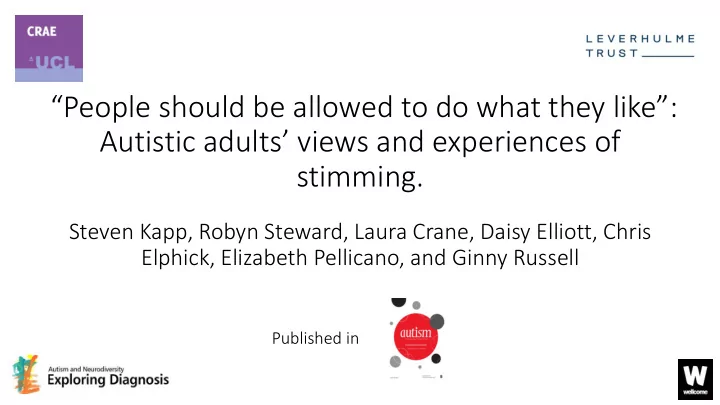

“People should be allowed to do what they like”: Autistic adults’ views and experiences of stimming. Steven Kapp, Robyn Steward, Laura Crane, Daisy Elliott, Chris Elphick, Elizabeth Pellicano, and Ginny Russell Published in
Background • Critical language and treatments for stims remain popular • Despite weak grounds scientifically and ethically • Autistic people and neurodiversity activists say stims are useful • Pilot study: autistic adults usually value, enjoy stimming (Steward, 2015) • No in- depth study on autistic people’s perspective on stimming
Study Aims To examine autistic adults’ 1) Understanding of repetitive ‘stimming’ behaviours 2) Perceptions of why they stim 3) Views on the value, if any, of such behaviours
Method • 31 autistic adults were recruited in Southwest England and London • Participants took part in interviews ( n = 19) or focus groups ( n = 12) • Data were combined in thematic analysis (Ngulube, 2015, adapted from Braun and Clarke, 2013; 2006)
Results: Stimming as a Self-Regulatory Mechanism • Stimming: a repetitive behaviour (body movements or vocalisations) • Soothed excessive emotions caused by intense sensations or thoughts
Results: (De)stigmatisation of stimming • Participants resented being told or made to stop stimming • Many tried to suppress their stims, transmute them into different forms, and conceal them from view • They wished to avoid harmful stims • Stimming became less acceptable with age • Others’ understanding paved the way to acceptance
Discussion • Stimming is a helpful coping mechanism for many autistic people • Can calm and communicate emotions, aide concentration and learning • Social (understanding and) acceptance of non-harmful stims is key • Ethical treatment of self-injurious, dangerous stims may be warranted …as long as it’s not harmful
Future directions • Research autistic people’s views on (treating) causes of stims • (Hyper)sensitivities, cognitive inflexibility, and emotional dysregulation? • Compare stimming with non- autistic ‘fidgeting’: does everyone stim?
Acknowledgments • Daisy Elliott, Chris Elphick, Ginny Russell, and I were supported by the Wellcome Trust [108676/Z/15/Z]. • Elizabeth Pellicano was supported by a 2015 Philip Leverhulme Prize from the Leverhulme Trust. • Participants for taking part in the study • Carers for their support during interviews • An autism training centre, Chee Wong, and Dr Melissa Bovis for their assistance with the focus groups. • The reviewers provided invaluable feedback, as did Dr Jean Harrington on the figures for and drafting of the manuscript.
Quotes • Stimming as a soothing feedback loop: “So it just sort of helps quell everything, because you’re at the same rhythm with everything” ‘Luke’ • “Stimming is just the release of any high emotion, so really anxious, really agitated, really happy…” ‘ Rebecca’ f • On “ABA” in which “they basically condition them like Pavlov’s dogs to stop stimming”: “to me it was abuse, because stopping those children stimming when they’re trying to calm themselves down or cope with a situation, because even if they manage all the environment around them, there might be situations that they find stressful, and if they haven’t got the ability to calm them down, then they could be relying on other people for the rest of their lives or have a breakdown…” ‘Rose’
Recommend
More recommend